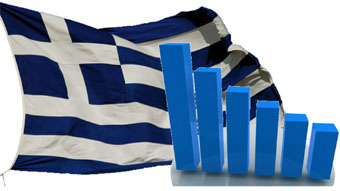
Greek Stock Sell-Off
| published August 3, 2015 |
By Thursday Review staff
More than five weeks of closed markets and trading limitations did little to allow fears among investors in Greece to cool, and as the markets opened on Monday, August 3, stocks began a freefall on the Athens Exchange. Investors dumped almost everything, sending the market spiraling down by 22.8 percent in a single day of trading, and sparking concerns that Greece may not be out of its year-long economic crisis.
Banks and financial institutions were the hardest hit in Monday’s trading, and some banks watched as their stock value dropped by nearly 30 percent.
Greece has faced market and financial difficulty all year as various deadlines approached for the repayment of billions of dollar in loans from Europe and the IMF. Negotiations between Greek officials and Eurozone leaders have been tense, and fraught with threats—including the possibility that Greece would be either ousted, or would voluntarily remove itself, from the euro. The resulting crisis forced banks to reduce their hours and limit ATM withdrawals, financial institutions to halt trading, and the government to impose draconian restrictions on credit card activity and the movement of money from Greece to other countries. The crisis also threatened pension and retirement payments, and triggered weeks of panic buying by consumers.
After months of tense talks, coupled with threats and counter-threats (including the outcome of a nationwide referendum on the issue weeks ago), EU leaders and Greek officials crafted a tentative solution—additional lending, an extension on the deadline for debt repayment, all linked to more spending limitations and additional austerity measures. Experts had been hopeful that the cooling off period would allow investors to regain confidence.
Despite the Monday selloff, some analysts were guardedly hopeful, suggesting that once the panic selling runs its course, investors would surge back into the Greek markets in an aggressive search for bargains. Such buying might push values back up, and help the long-suffering Greek economy to regain its footing toward recovery. A few analysts were even suggesting that by the week’s end, stocks could start climbing back up—a judgment based on the fact that a few Greek-based companies seemed able to survive Monday’s selloff (telecommunications and technology companies, in particular).
Some banking restrictions will remain in place for Greek citizens, and Euro leaders have extracted promises from Greek officials that certain forms of spending be greatly reduced or limited, and that budget requirements be met.
Related Thursday Review articles:
Cash-Strapped Greece Given New Deadline; Thursday Review; July 8, 2015.
Will Greece Avert Financial Derailment?; Thursday Review; July 6, 2015.
